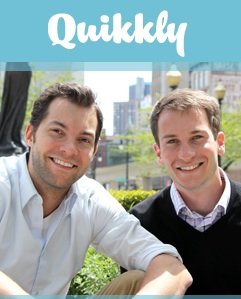 In anticipation of the Techonomy Detroit conference on September 12, we profiled six Detroit tech startups that are driving the city’s re-emergence as a center of innovation.
In anticipation of the Techonomy Detroit conference on September 12, we profiled six Detroit tech startups that are driving the city’s re-emergence as a center of innovation.
Detroit has become notorious as a symbol of the decline of American manufacturing, but in recent years the city’s tech start-up scene has quietly started to attract attention and generate renewed optimism. Investors like Detroit Venture Partners have sought to rebuild the city through entrepreneurship, financing successful tech-focused efforts, including Detroit Labs’ web, iOS, and Android applications. Detroit is now home to an outpost of TechShop, the Silicon Valley innovation incubator where people of all skill levels can use industrial tools and equipment to build their own products. Meanwhile, entrepreneurship accelerator Bizdom offers seed funding to help grow innovative, tech-based local startups.
Quikly (formerly Quikkly) was founded in Philadelphia, but moved to Detroit early this year after Detroit Venture Partners invested in the company. Quiklys are short-term offers, announced randomly via text or Facebook, that give the best deal to first responders. For instance, a $10 coupon to Fandango costs $1 for the early birds and $8 for slowpokes. I spoke with Shawn Geller, co-founder and CEO of Quikly, about how he got into the online coupon biz and what it’s like running a business in Detroit.
A lot of people criticize sites like Groupon for not delivering deals as promised, and for ultimately hurting the small businesses that use its service—some have even reported losing money because of a Groupon deal gone wrong. How does Quikly compare?
We think of a daily deal site like Groupon as passive. I get an email at 5 or 6 in the morning, it’s available for 3 or 4 days—there’s really no urgency to it. We think that a lot of those platforms really build brand erosion. The mentality that we are trying to build around Quikly is “I need to act fast on this.” So there are a finite number of deals available, they’re not available for longer than a couple of hours at most, and you’re not really counting on it. We think of it as an event that really creates excitement around a brand as opposed to eroding a brand.
How did you come up with the Quikly concept?
As a recent college grad, I was part of a company called Student Coupons that flourished into what Quikly is now. We were putting together different offers, but instead of making a coupon booklet or anything like that, we were going around to a bunch of different college campuses and getting retailers to tell us when they were sort of dead. We were also getting lists of people together from those schools who we could text an offer to at any point. We called it a flash deal, so at any moment it would be released, and there would only be a certain number of them available. To claim an offer for Papa John’s Pizza on the University of Pittsburgh campus, we would text everyone, and they would respond back “Papa John’s.” Then we would send them the offer and they could go in and use it. Within a period of maybe two hours, we were able to drive close to 100 people into a store that normally had notoriously little traffic on that day. We built a social element around it, adding Facebook, so each time someone claimed an offer, it would say, “Shawn claimed a $10 offer to Papa John’s,” with a URL back to the page. The issue was that if I went to the University of Pittsburgh and you were at Michigan, it wasn’t relevant to you as an offering. That’s when we figured out that we were going to try and take the regional and national approach to reaching out to brands that were looking for exposure across all college campuses, and we sort of blossomed into what Quikly is today. It was a great way to create engagement for some brands, but wanted to take it another step. So now, at any moment, a Quikly can be released, and the quicker you are to claim it, the lower the price point. And as more people claim it, it goes up in price. Before, everyone was getting the same offering and it was the same price. Now you know that the first movers are really the go-getters and they are the ambassadors who say, “Oh, I was number one to claim this, or I was number 15 to claim this, and I got it for $1,” and they sort of have bragging rights. And we’ve built up our database to close to 50,000 people who are on the site.
What have been the most popular deals?
We are trying to figure out exactly what sticks with consumers, what’s getting them excited, what are we able to push out. Last week was our first offering where we had the variable price model. It was actually pretty nerve-wracking. We sponsored $10 off at Fandango. We had 500 of them available for claim, and they ranged in price from $1 to $8. Within 15 minutes, we had 450 people who had actually claimed the offer in that price range. The issue we had that we didn’t expect was that we ran into some server issues because we didn’t understand what the traffic levels would look like.
What has it been like since you’ve been in Detroit?
I’ll tell you what, there is really a lot going on here. Our office is at the M@dison [Detroit’s entrepreneurial tech hub], which is like the central point for everything going on. Twitter just put a couple people in our offices, and there are more and more startups that are coming out here, even from out West. I think I’m a prime example of someone who had never even been to the Midwest before, or Michigan for that matter. Coming out, checking out the space, and seeing the resources and the people that are available to really tap into and leverage, it really has been just a great experience. There has not been one time in the past six months that I’ve been here that I’ve questioned whether this was the best decision for me to come out here and be a part of what is going on.
Should the rest of the country keep its eyes on the Detroit startup scene?
Absolutely. We had a pitch day here a month or so ago, and they had VCs come from all over the country just trying to figure out what was actually happening here for their own benefit and to see with their own eyes. I think that they were pleasantly surprised, especially with the performances of a lot of our pitches. I think that they were definitely intrigued by what is going on. As a community, everyone should be aware of what is going on downtown here.
For complete coverage of the September 12, 2012, Techonomy Detroit conference, click here.
Detroit-based Startup Quikly Rewards Nimble Bargain Hunters
In anticipation of the Techonomy Detroit conference on September 12, we're profiling six Detroit tech startups that are driving the city’s re-emergence as a center of innovation. Quikkly was founded in Philadelphia, but moved to Detroit early this year after Detroit Venture Partners invested in the company. Quikklys are short-term offers, announced randomly via text or Facebook, that give the best deal to first responders. For instance, a $10 coupon to Fandango costs $1 for the early birds and $8 for slowpokes. I spoke with Shawn Geller, co-founder and CEO of Quikkly, about how he got into the online coupon biz and what it’s like running a business in Detroit.















